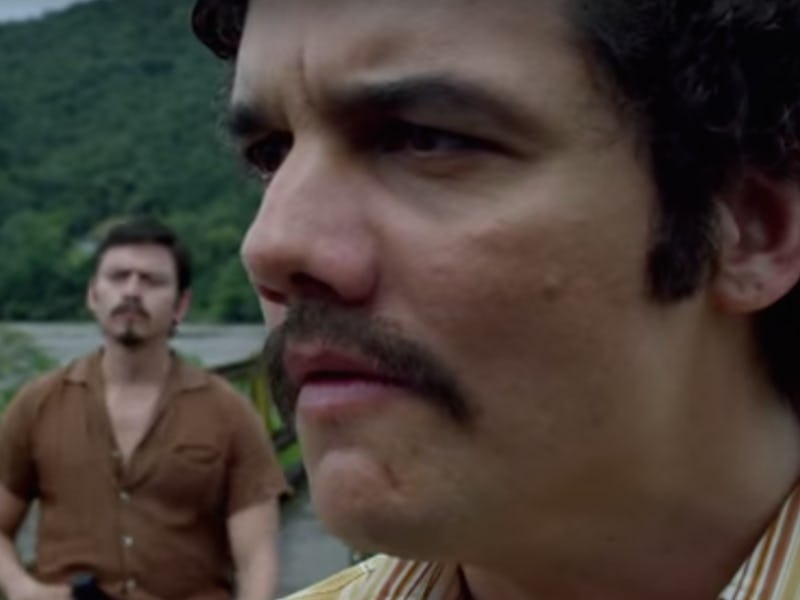Netflix's 'Narcos' Introduces a Complex Monster Named Pablo Escobar
This will become the streaming network's new standard for drama.

Pablo Escobar looks at the guns of the drug agents in his path, but does not seem worried. The D.A.S. men are Columbia’s version of [The Untouchables](https://en.wikipedia.org/wiki/TheUntouchables(film), paid well, no history of corruption. Unhurried, Escobar (Wagner Moura) begins to call the officers by name, then the names of their families. The choice he is offering is clear: bribe or blood? Escobar does not offer a preference, and likely does not have one.
It’s a Keyser Söze moment, a threat of bloodshed so over-the-top it would risk losing its weight if not for the man giving the ultimatum. Towards the end of the pilot episode of Narcos, Netlix’s riveting new drama about the final years of Escobar’s multi-billion drug empire, Drug Enforcement Administration agent Steve Murphy (Boyd Holbrook) runs the numbers over real-world footage of corpses and cash, and tells us that between 1979 to 1984, the cocaine gushing into the States led to some 3,245 murders in Miami. Were all of those Escobar’s wake? Maybe not. But by the time Escobar died in a gunfight with a collection of authorities and vigilantes in 1993, he had been officially tied to at least 3,000 deaths.
Three-thousand people is one-man 9/11. That’s more than SARS, and some blood donation centers are still asking donors questions about that shit a decade on from the outbreak. That’s more than twice as many fatalities as every major outbreak of ebola from 1976 all the way up to 2013 combined. If Escobar had been a virus, the World Health Organization would’ve quarantined Colombia.
But at home he was also a man of the people and a self-styled Robin Hood with an eye on political office. For a monster, he was complex. The benefit of adapting his story to a dramatic series is getting to move at a pace slower than Escobar biopics like Escobar: Paradise Lost, which wasted a perfectly cast Benecio del Toro trying to cram a fully realized portrait into a two-hour narrative.
The needle threading that messy tangle of plot and drug trade business is Murphy’s DEA agent hero, who by the end of the pilot has just survived a shootout with cocaine cowboys, prompting Escobar to issue a $500,000 bounty on the head of every DEA agent. Murphy’s narration is unaffected tough guy, one great pop song montage away from Scorsese’s Crime As Big Business trilogy of Goodfellas, Casino, and Wolf of Wall Street. It’s an effective way to get information out without hobbling the narrative stride. If there’s a weakness here, it’s that Murphy’s narrator — the kind of guy who’d tell you his dad signed up for WWII because of Pearl Harbor — can almost seem too down-home and blandly good, though it’s hard to picture any actor coming off differently compared to Moura’s accountant’s ruthlessness.
Not long after Murphy gives us those homicide numbers he mentions that nobody cared about the bodies, just the money hemorrhaging out of the economy. Then we cut to Nancy Reagan giving her famous “Just Say No” speech, selling the drug war on the righteous cause of protecting America’s children. Considering the collateral damage of that fight 30 years on, I’m thinking Murphy has the right idea.